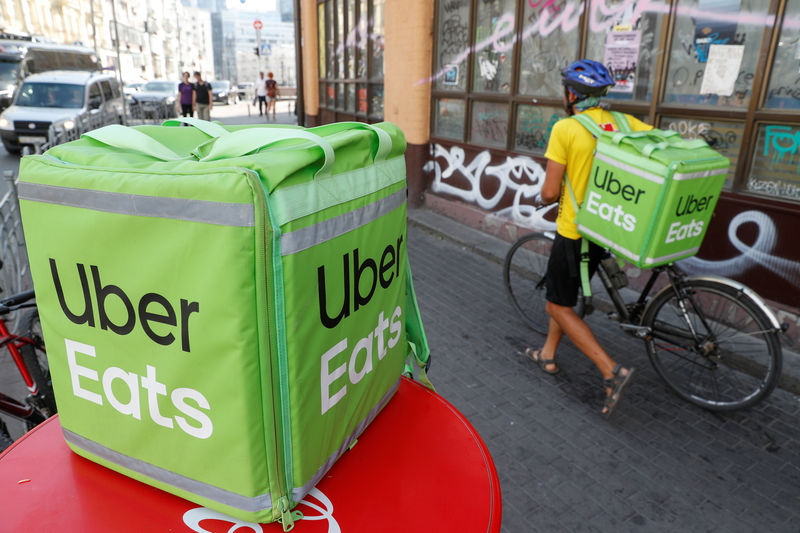By Hilary Russ
NEW YORK (Reuters) - In a letter to investors before its share price plunged last week, online food delivery service GrubHub Inc (N:GRUB) cited its profitable ties with small and medium-sized restaurants, saying they generate 80% of the orders on its platform.
"This is a highly lucrative relationship for both parties," the letter said.
But some restaurants think otherwise and have begun pushing back against what they see as the relationship's unfair distribution of profits.
A growing number of small and mid-sized food chains want to reduce ordering and delivery commissions as high as 30% charged by the big four third-party platforms - GrubHub, Uber Technologies Inc's (N:UBER) Uber Eats, DoorDash Inc and Postmates Inc, industry sources say.
"They hate the relationship and they are getting raked over the coals," said Ben Gaddis, president of T3, a digital marketing and tech consultant to restaurants such as Pizza Hut and Schlotzsky's. "The smaller they are, the more it impacts their margins."
The delivery platforms charge restaurants for having their menus listed on their sites, which customers can use to place orders - similar to the way consumers book hotel rooms through third-party online marketplaces like Priceline, Kayak or Expedia (O:EXPE). Restaurants pay higher fees if they want to be listed more prominently, or if they use the services to deliver the orders placed through them.
"They've become this necessary evil," said Bareburger Group Chief Executive Euripides Pelekanos, referring to the delivery platforms. The organic burger chain with 46 stores mostly in the northeast hopes to be rid of all third-party platforms by 2020.
In 2017, Bareburger booked $20 million in revenue from orders placed through third-party platforms, Pelekanos said, but it also spent about $2.5 million to $3 million in related fees.
For the restaurant industry, that roughly 15% rate "is our whole margin," Pelekanos said.
Thanks to intense competition among third-party services, restaurants with just 25 to 50 locations recently have found they have more leverage to negotiate better terms, according to Gaddis, the tech consultant.
Last week, GrubHub shares tanked, closing the week down more than 40% after the company reported weak sales and lowered forward guidance, citing hyper competition from rivals.
When Uber reports earnings on Monday investors were expecting to see that price-competition in its core ride-hailing business has eased - even as it heats up for the food delivery business.
Uber may be spreading itself too thin with Uber Eats, particularly in a market where no U.S. company has shown sustained profitability, some analysts say.
"Some investors may prefer Lyft's higher growth and absence of exposure to Eats, which remains very competitive," Bank of America (NYSE:BAC) analyst Justin Post said in a note to clients. Lyft Inc (O:LYFT) is Uber's leading rival in the ride-hailing business, which Uber has acknowledged may never be profitable.
Uber said it could not comment on its food delivery business during its quiet period ahead of earnings.
As it faces demands for lower fees, GrubHub acknowledged in a statement to Reuters that its commission rates are negotiable, depending on the level of services required.
Chicago-based GrubHub also said restaurants had been "getting more orders with larger overall ticket prices through our platform on a year-over-year basis" since 2014.
"Not only are restaurants getting more orders, but each order is getting bigger as well. This translates into increased incremental revenue that we believe off-sets a negotiated commission," the company said.
Still, some restaurants are building their own apps and turning to alternative delivery operations. Having their own apps also allows them to hold on to valuable data about customers who place orders.
In February, Bareburger rolled out its own app and website through a startup called Lunchbox, which it helped launch. The service costs about $750 per month per location.
The burger chain is also using a company called Relay, which charges $5 to handle each delivery. The costs are well below the $8,000 per month each Bareburger outlet spends on third-party platforms and related apps, Pelekanos told Reuters.
Bareburger employees also staple advertising cards to orders delivered through GrubHub, to redirect customers to Bareburger's own site.
Bareburger is still taking roughly 80% of its delivery transactions through GrubHub, but the chain plans to dump third-party platforms once its own Bareburger channels start processing at least 50% of all digital orders.

It took one of its restaurants off all the platforms last year for a one-month trial. Sales volume fell, but profits remained the same, Pelekanos said.